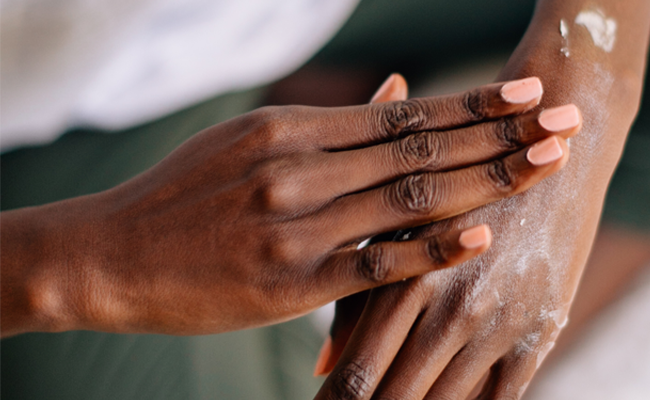“OH SHE GLOWS!”: A Skin Rehab Guide
By: Rachel Werner
Too much fun in the sun without proper skincare can leave skin chapped, cracked and lackluster. Step out ready to let your #blackgirlmagic radiate from the inside out by infusing more moisture into dry areas with hydrating cleansers, botanical creams and restorative serums—softening delicate areas with important nourishment after exposure to frigid temps and harsh winds all winter. Inua Naturals founder and international health advisor Abir Ibrahim recommends rejuvenating your skin this spring via these three steps:
Step 1
- A healthy diet is an essential part of achieving healthy skin. Antioxidants help protect skin against free radicals in the environment, which are damaging to skin cells. Superfoods like Moringa and Baobab are rich in vitamins B6 and B12 that help prevent harmful environmental stressors from breaking down the skin’s elastin and collagen, resulting in more youthful, healthier skin.
Step 2
- Vitamin C is one of the most powerful antioxidants and plays an important role in protecting the skin against environmental aggressors and preventing premature signs of aging like fine lines, wrinkles, dullness and even dark spots and hyperpigmentation. Baobab Fruit is an African superfood that contains one of the highest vitamin C content and is a main ingredient in Inua’s best-selling vitamin C products like Miracle Moringa Elixir.

Step 3
- Even though melanin provides some protection from UV light, the sun still has damaging effects to the skin of people with deeper skin complexion. Black women are not immune to sun-related skin cancers and it is critical that women use a daily moisturizer containing broad-spectrum SPF 30 or higher.
According to the Skin Cancer Foundation, “different ethnicities are at higher risk for particular skin malignancies…because many doctors and patients believe people of color are immune to skin cancer, diagnosis is often delayed, sometimes until the disease is advanced and potentially fatal.” The Skin of Color Society further affirms that protection is the first line of defense. “It is a myth that skin of color individuals do not require the use of sunscreen or as much sunscreen as fair skinned individuals. While skin of color does not tan or burn easily, the damage caused by UV rays still occurs with sun exposure.”

Thus, prioritizing beauty boosting choices over reactive purchases will ensure your natural glow doesn’t start to fade prematurely. Whether looking to restore radiance, ward off environmental damage and/or lessen the appearance of acne, an organic serum such as Dehiya’s The Afterglow Face Serum may be just the balm you seek to soothe stressed skin. Plus, finding the right product via mainstream retailers can be challenging for Black women, which is why FLOW Perfectly Balanced Facial Oil creator and The Afro Hair & Skin Co. started making small-batch, ethnically-sourced products to “eliminate all of the common toxins that she felt contributed to the undermining of black women's health and well-being.”
Keep in mind Ibrahim stressed that effective skincare goes well beyond a superficial level since many chronic dermatological issues are preventable by reducing risk factors through cultivating a holistic approach to wellness.
To eliminate the need for invasive or expensive cosmetic procedures down the road:
- Don’t smoke
- Maintain a healthy weight
- Exercise regularly
- Eat healthy
- Limit alcohol intake
- Protect your skin
Although sun protection is a major priority in the summer months due to increased exposure to harmful rays, it should remain year round—especially for female #fitwarriors whom participate in a plethora of outdoor activities. Piggybacking off of Ibrahim’s suggestions, additional preventative measures include restricting time spent in midday sun, wearing broad-rimmed hats and using a facial moisturizer or foundation everyday with a SPF 15, preferably higher, to assist in avoiding damage.
A few other nutritional supplements offer protection as well. Vitamin E, along with green tea and fern extract, can also be helpful at preventing scars, moles and age spots because oxidative injury to a cell—also a key component in developing fine line and wrinkles—is irreversible.
Supercharged foods from sprouted bread to pressed juices to raw bars likewise are potential edible antidotes worth perusing in the grocery aisle. Carbone Cancer Center nutritionist Darcy Stagman cites recent research in stating, “eating a variety of plant-based foods throughout the day can lower one’s risk of cancer and other types of chronic ailments.”
Preventive and restorative health properties are attributable to certain phytochemicals such as carotenoids and antioxidants. Foods like avocado, blueberries, carrots, kale and whole grains contain a higher level of these vital nutrients, though Stagman cautions “it’s hard to connect positive outcomes to just one particular food,” thus she advises having two-thirds of your plate at every meal be comprised of plant-based foods “to maximize nutritional gains” and support healthy skin cell regeneration.
What do you do to rejuvenate your skin? What products do you use? Tell us in the comments below.

